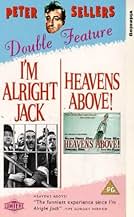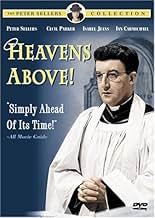IMDb-BEWERTUNG
6,7/10
1790
IHRE BEWERTUNG
Füge eine Handlung in deiner Sprache hinzuA minister is accidentally appointed to a snobbish parish.A minister is accidentally appointed to a snobbish parish.A minister is accidentally appointed to a snobbish parish.
- Nominiert für 1 BAFTA Award
- 1 Nominierung insgesamt
Empfohlene Bewertungen
This is one of the classic British comedies of the 1960's Peter Sellers is superb as the Rev Smallwood a socialist priest mistakenly sent to an upper-crust English village. Eric Sykes and Cecil Parker excel in their roles, Sykes as the lay about, work dodging Smith and Parker as the holier than thou archdeacon. Irene Handle and Ian Carmicheal also make appearances in this film in their typical roles played to perfection.
This film is a satire (with elements of farce) on British society particularly the class system as well as religions role in it. The character are typically English and all show their true nature as the Rev Smallwood bumbles his way into a media frenzy without really knowing it.
All in all if you like British comedy this film is a must see but if you haven't lived in the U.K some of the lines and issues may be lost on you.
A classic up there with the likes of The Ladykillers and Lavender Hill Mob as the cream of British Comedy. 8/10
This film is a satire (with elements of farce) on British society particularly the class system as well as religions role in it. The character are typically English and all show their true nature as the Rev Smallwood bumbles his way into a media frenzy without really knowing it.
All in all if you like British comedy this film is a must see but if you haven't lived in the U.K some of the lines and issues may be lost on you.
A classic up there with the likes of The Ladykillers and Lavender Hill Mob as the cream of British Comedy. 8/10
I shan't go on at any length, as others have already done the job for me. Instead I'll just drop in a couple of interesting factoids about this film.
1) "Heavens Above!" was the third in a trio (a triptych??) of films satirising great pillars of the British establishment:
The military;
Industry/the trade unions;
The church.
The previous two in the series were "Private's Progress" (Ian Carmichael as Stanley Windrush - a fraightfully posh chinless wonder, drafted into the army for WWII and finding himself embroiled unwittingly in a grand scheme to steal great works of art) and "I'm Alright, Jack" (Carmichael as the same Stanley Windrush, now de-mobbed and dumped by his despairing family into the shop floor workforce at one of their factories, in the hope that he might learn the business). The Windrush family characters were dropped for Heavens Above, although Carmichael makes a small appearance as "the other Vicar called Smallwood".
2) Fans of the Small Faces should keep their eyes peeled for 'Jack' - eldest son of the huge family of itinerant scroungers who take up residence in the vicarage. It's none other than cheeky cockney mudlark STEVE MARRIOTT, fresh from his West End stint as The Artful Dodger in Oliver !
1) "Heavens Above!" was the third in a trio (a triptych??) of films satirising great pillars of the British establishment:
The military;
Industry/the trade unions;
The church.
The previous two in the series were "Private's Progress" (Ian Carmichael as Stanley Windrush - a fraightfully posh chinless wonder, drafted into the army for WWII and finding himself embroiled unwittingly in a grand scheme to steal great works of art) and "I'm Alright, Jack" (Carmichael as the same Stanley Windrush, now de-mobbed and dumped by his despairing family into the shop floor workforce at one of their factories, in the hope that he might learn the business). The Windrush family characters were dropped for Heavens Above, although Carmichael makes a small appearance as "the other Vicar called Smallwood".
2) Fans of the Small Faces should keep their eyes peeled for 'Jack' - eldest son of the huge family of itinerant scroungers who take up residence in the vicarage. It's none other than cheeky cockney mudlark STEVE MARRIOTT, fresh from his West End stint as The Artful Dodger in Oliver !
Heavens Above! has so much going for it - a wonderful and very gentle performance by Sellers, a who's who of British comedy from the late 1950s, and the Boulting Brothers at the helm. This is a film that stands the test of time and remains both fun and interesting and a fascinating take on Anglicanism. In Britain, children of a certain class went to privileged school with the eldest son being shipped off to serve as an officer, or join the Foreign Office for the larger good of the Empire, and the second son would go to the City or the Church.
Anglican vicars aren't meant to be like Peter Seller's John Smallwood - who really does hold to the Gospel rather than doctrine, and is appointed vicar, by mistake, of a decidedly complacent and snooty town. What follows gently pokes fun at the double standards.
All in all, this remains one of Seller's gentlest, truest, and straightest characterisations. Like Alec Guinness he really does become the character he's playing - from the hair to the accent to the smallest gestures, but more than that, here, is the heart. He captures something ethereal that we would all recognise as sincerity and good intentions.
When he introduces true gospel values everything, of course, starts to fall apart. Historically, this is interesting in that Billy Graham has come to Britain and there is something of that spirit about this; but it is no way heavy handed or blunt.
Heavens Above! resorts to a weak ending - wish he'd been sent to the East End of London or Liverpool - but it remains a wonderful film well worth the time to catch when it comes around.
Anglican vicars aren't meant to be like Peter Seller's John Smallwood - who really does hold to the Gospel rather than doctrine, and is appointed vicar, by mistake, of a decidedly complacent and snooty town. What follows gently pokes fun at the double standards.
All in all, this remains one of Seller's gentlest, truest, and straightest characterisations. Like Alec Guinness he really does become the character he's playing - from the hair to the accent to the smallest gestures, but more than that, here, is the heart. He captures something ethereal that we would all recognise as sincerity and good intentions.
When he introduces true gospel values everything, of course, starts to fall apart. Historically, this is interesting in that Billy Graham has come to Britain and there is something of that spirit about this; but it is no way heavy handed or blunt.
Heavens Above! resorts to a weak ending - wish he'd been sent to the East End of London or Liverpool - but it remains a wonderful film well worth the time to catch when it comes around.
This film is great fun, well written and well acted. While the ending is unexpected, if you haven't seen it before, it is difficult to know how all the issues could've been resolved in any other way except as unresolved as it is here! They did the same thing to John Steed in the very last episode of The Avengers, appropriately titled "Bizarre", some six years later! That episode featured Roy Kinnear as the marvellously named Bagpipes Happychap who also features here amongst a wealth of famous faces including the original Doctor Who, William Hartnell, in the year that he took that role. Again, considering the ending, that too seems appropriate now and brought a wry smile to this viewer's face especially as another of the film's cast, Mark Eden, also appeared, in the title role of "Marco Polo", opposite Hartnell in that series!!! Peter Sellars is on fine form as the hopelessly idealistic new vicar as is Eric Sykes as a chain smoking butcher! Best of all is the plethora of verbal and visual irony which should be enough to keep any discerning viewer entertained!!!
"Heaven's Above!" is a wonderful, well-crafted satire that mocks not Christianity but hypocritical and cold "religious" people. It is a British version of "In His Steps" turned on its head and inside-out: what if a sincere believer (Sellers) attempts to live out the gospel in the middle of a spiritually dead English parish? Unchristian attitudes range from the Bishop who complains that Rev. Smallwood (Sellers) "keeps bringing God into everything," to two women arguing over free food they have just (undeservedly) received as handouts telling a black man (Brock Peters) "You don't belong here" under a banner that reads "Love one another."
The script is rife with topical political and social comments but the real focus is timeless: do people really believe what they say they believe? Is there a place for Christianity in a secular, materialistic society? The ending, which baffles some, gives the answer to this. All serious questions aside, "Heaven's above!" is a satirical, incisive look at human nature.
The script is rife with topical political and social comments but the real focus is timeless: do people really believe what they say they believe? Is there a place for Christianity in a secular, materialistic society? The ending, which baffles some, gives the answer to this. All serious questions aside, "Heaven's above!" is a satirical, incisive look at human nature.
Wusstest du schon
- WissenswertesSteve Marriott, who played Harry Smith's son Jack, was later to become the lead singer and guitarist with influential English rock group, the Small Faces.
- PatzerWhen on the train at the 1:34:30 mark, the Godminster Gazette newspaper headline mentioning Orbiston Parva has left the R out of Parva spelling it Pava.
- Alternative VersionenOriginal British version runs 118 minutes.
- VerbindungenFeatures Verdammt in alle Ewigkeit (1953)
Top-Auswahl
Melde dich zum Bewerten an und greife auf die Watchlist für personalisierte Empfehlungen zu.
- How long is Heavens Above!?Powered by Alexa
Details
- Erscheinungsdatum
- Herkunftsland
- Sprachen
- Auch bekannt als
- Heavens Above!
- Drehorte
- Claremont House, Esher, Surrey, England, Vereinigtes Königreich(Holcomb Manor - Lady Despard's mansion)
- Produktionsfirma
- Weitere beteiligte Unternehmen bei IMDbPro anzeigen
- Laufzeit1 Stunde 58 Minuten
- Farbe
- Seitenverhältnis
- 1.66 : 1
Zu dieser Seite beitragen
Bearbeitung vorschlagen oder fehlenden Inhalt hinzufügen





































